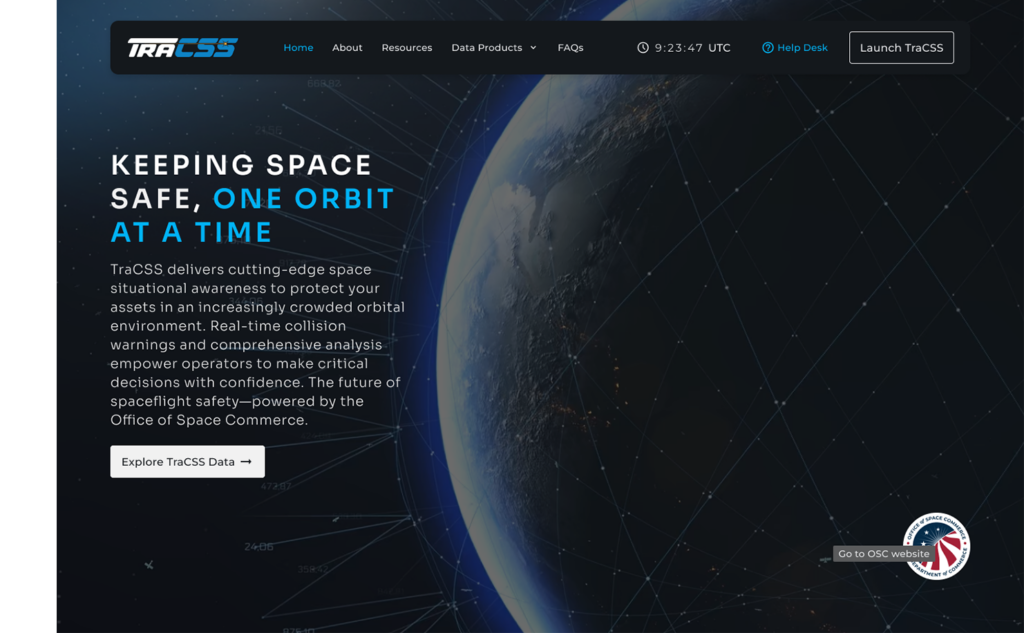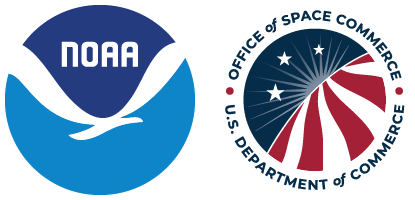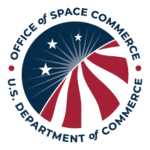
Traffic Coordination System for Space
NOAA’s Office of Space Commerce (OSC) is developing the Traffic Coordination System for Space (TraCSS) to provide basic space situational awareness (SSA) data and services to civil and private space operators in support of spaceflight safety.
TraCSS is being developed to implement President Trump’s direction in Space Policy Directive 3 for the Department of Commerce to provide space operators with space traffic safety data and services.

As an Agile software development program, TracSS will continue to field iterative upgrades and add new capabilities. The initial version, released September 2024, distributes TraCSS-produced conjunction data messages (CDMs) to a beta set of users via the Space-Track.org interface. As the TraCSS user interface matures, OSC will migrate users to TraCSS.gov.
Stakeholders interested in engaging with
TraCSS may reach out to TraCSS.Outreach@noaa.gov.
Resources
News & Announcements
OSC Opens TraCSS “Waitlist” for Satellite Operators
Background: NOAA’s Office of Space Commerce (OSC) is developing the Traffic Coordination System for Space (TraCSS) to provide basic space situational awareness (SSA) data and services to civil and private space operators in support of spaceflight safety. As of February 2026, 17 organizations are pilot users of TraCSS. On February 4, 2026,…
Full Article OSC Opens TraCSS “Waitlist” for Satellite Operators
OSC Publishes Updated TraCSS Specifications
Today, January 22, 2026, the Office of Space Commerce (OSC) published updated specification documents for the Traffic Coordination System for Space. These specifications replace those previously hosted on the Office of Space Commerce website. The specifications may be accessed via the links below, or on OSC’s TraCSS Archive webpage. Questions…
TraCSS Update: Delivering on SPD-3 and Advancing Spaceflight Safety
As the Traffic Coordination System for Space (TraCSS) approaches production release, the Office of Space Commerce is pleased to announce new solicitations through GSA’s Global Data Marketplace (GDM) for a “Commercial Conjunction Assessment Screening Services” (CASS) pilot. These solicitations represent an important first step toward improving conjunction analysis quality -…
Full Article TraCSS Update: Delivering on SPD-3 and Advancing Spaceflight Safety
TraCSS Update: Expanding Space Safety Partnerships
The Office of Space Commerce is pleased to announce that Amazon Kuiper recently joined leading names like Iridium, OneWeb, SpaceX, Maxar, Planet, and Intelsat, among others, to become a pilot user of the Traffic Coordination System for Space (TraCSS). Through the Office of Space Commerce, TraCSS now provides spaceflight safety screening…
Full Article TraCSS Update: Expanding Space Safety Partnerships
TraCSS Expands COLA Gap Pathfinder Initiative
The Office of Space Commerce (OSC) is pleased to announce that the Traffic Coordination System for Space (TraCSS) program has added another commercial space situational awareness (SSA) services provider – Kayhan Space – to bring an additional dimension to the recently launched COLA Gap Pathfinder initiative. This new collaboration will explore how…
OSC Publishes Updated TraCSS Schedule & Roadmap
As a public space situational awareness system, the Office of Space Commerce’s Traffic Coordination System for Space (TraCSS) embraces the principles of transparency and openness. To keep stakeholders appraised of the program’s development. OSC has published the latest public release of the TraCSS schedule and roadmap, which can be accessed here. As…
Full Article OSC Publishes Updated TraCSS Schedule & Roadmap
OSC Discusses International SSA Coordination with Space Cafe Radio
https://www.youtube.com/watch?v=JjfMFHsZtys In June, the Office of Space Commerce’s Acting Director, Janice Starzyk, and Head of International SSA Engagement, Dr Mariel Borowitz, sat down with Yvette Gonzalez of Space Cafe radio for a discussion on the Traffic Coordination System for Space, the evolution and future of space traffic management, and OSC’s…
Full Article OSC Discusses International SSA Coordination with Space Cafe Radio
TraCSS Listening Session: Updated CDM & OCM Specifications
https://www.youtube.com/watch?v=-QMbuJ6xYf0&feature=youtu.be On Friday, August 1, 2025, the NOAA Office of Space Commerce (OSC) held a virtual Traffic Coordination System for Space (TraCSS) stakeholder listening session on the updated TraCSS Conjunction Data Message (CDM) and Orbit Comprehensive Message (OCM) Specifications. This listening session was an opportunity for stakeholders to provide feedback…
Full Article TraCSS Listening Session: Updated CDM & OCM Specifications
TraCSS Welcomes SpaceX as 10th Beta User
The NOAA Office of Space Commerce (OSC) is pleased to announce that SpaceX has joined the Traffic Coordination System for Space (TraCSS) as the system’s 10th beta user. With the addition of SpaceX, TraCSS is now able to validate its on-demand conjunction screening and on-demand maneuver screening service at significant scale – a…
OSC Announces Awardees of the Commercial COLA Gap Pathfinder
On June 11, 2025, the NOAA Office of Space Commerce announced the selection of awardees for the Traffic Coordination System for Space (TraCSS) program’s Commercial Collision Avoidance (COLA) Gap Pathfinder effort, originally posted on the Global Data Marketplace. Together, these awards amount to a total of $10.1M. “These awards mark…
Full Article OSC Announces Awardees of the Commercial COLA Gap Pathfinder
OSC provides TraCSS “as is” and without any warranties, including, for example, that data and information from TraCSS will be error free or that access will be uninterrupted. The United States Government is immune from any suit arising from the provision or receipt of SSA data or information.



